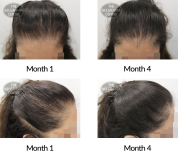-
Male Hair Loss Conditions
- Male Pattern Hair Loss
- Other Conditions
-
Male Hair Loss Treatments
- Hair Loss Treatments – A Guide
-
Patterns of Hair Loss
- Receding Hairline
- Thinning Crown
- General Thinning
-
Hair Loss Success Stories
- Hair Regrowth Photo-Gallery
-
Female Hair Loss Conditions
- Hair Loss in Women - Guide
- Female Pattern Hair Loss
- Telogen Effluvium (TE)
- Diffuse Thinning | Chronic TE
- Alopecia Areata
-
Female Hair Loss Treatments
- Female Hair Loss Treatments - A Guide
- Belgravia High-Strength Minoxidil
- Hair Vitalics For Women
- Clinical Treatment Therapy
-
Hair Loss Success Stories
- Women’s Hair Regrowth Photo-Gallery
-
Back
-
Male Hair Loss Conditions
- Male Pattern Hair Loss
- Other Conditions
-
Male Hair Loss Treatments
- Hair Loss Treatments – A Guide
-
Patterns of Hair Loss
- Receding Hairline
- Thinning Crown
- General Thinning
-
Hair Loss Success Stories
- Hair Regrowth Photo-Gallery
-
Back
-
Female Hair Loss Conditions
- Hair Loss in Women - Guide
- Female Pattern Hair Loss
- Telogen Effluvium (TE)
- Diffuse Thinning | Chronic TE
- Alopecia Areata
-
Female Hair Loss Treatments
- Female Hair Loss Treatments - A Guide
- Belgravia High-Strength Minoxidil
- Hair Vitalics For Women
- Clinical Treatment Therapy
-
Hair Loss Success Stories
- Women’s Hair Regrowth Photo-Gallery
Treatment for Alopecia Totalis and Alopecia Universalis
Alopecia Totalis and Alopecia Universalis are the two more extreme alopecia conditions, with Universalis being the most rare form of alopecia.
The difference between Alopecia Totalis and Alopecia Universalis is that,
For both conditions, the hair follicles remain alive but do not produce hair. They lie dormant, waiting for a signal to resume regular hair production. This means that people affected by Alopecia may regrow their hair naturally, even after years of appearing to be bald. However, it is impossible to predict if and when regrowth will occur.
There is no proven cure for Alopecia Totalis or Alopecia Universalis, however there are some forms of treatment which may help to stimulate hair regrowth, and research into possible hair loss treatments is on-going. Below is an overview of the potential treatments for these types of alopecia in relation to scalp hair loss only.
Whilst Belgravia does offer treatment for alopecia areata, if you suspect you may be suffering from Alopecia Totalis or Alopecia Universalis, we recommend you contact your GP for further advice.
Topical Immunotherapy

Topical Immunotherapy is currently the most promising option for treating Alopecia Universalis, with around a 40% success rate. This type of immunotherapy treatment addresses the alopecia by inducing, enhancing or suppressing an immune response.
Using a swab, the patient applies diphencyprone (DPCP) topically to their skin, in the affected areas of the scalp. The treatment should be carried out once a week, with the dosage being increased each time, so they gradually strengthen the solution. This also helps to avoid severe skin rashes which can occur if too high a dose is administered without first building up the skin’s tolerance to DPCP.
Patients should be aware that DPCP can cause allergic reactions that may lead to mild dermatitis (mild eczema), and treatment needs to be on-going in order to maintain any results. Other, less common side effects include vitiligo, which causes a rash and patchy skin discoloration.
Potential Treatments for Alopecia Totalis and Alopecia Universalis
Xeljanz / Tofacitinib Citrate

In the study carried out by Yale University’s medical centre, the subject regrew a full head of hair in around 11 months whilst following a course of tofacitinib.
Following these incredibly encouraging results, tofacitinib is being investigated further with trials currently underway to see if it may be a suitable hair loss treatment for alopecia sufferers, especially those with the more extreme forms.
There have been a number of concerns surrounding the serious side-effects connected to Xeljanz. The drug is currently unlicensed within the UK due to these issues and trials continue into its suitability. Researchers hoping to utilise this drug as a treatment for alopecia are testing a variety of formulations – including topical creams – in a bid to make it more suitable for use.
Dr Brett King of Yale University announced in March 2017 that he expected a JAK inhibitor solution for ‘moderate to severe alopecia areata’ to be released by 2021.
Jakafi / Ruxolitinib

Recent trials for the treatment of moderate to severe Alopecia Areata – including Alopecia Totalis and Alopecia Universalis have expanded on the initial study carried out at New York’s Columbia University Medical Centre. This saw three male alopecia patients, who were all almost completely bald, each regrow a full head of hair after four months of taking ruxolitinib tablets twice per day.
The drug is understood to currently be part of ongoing clinical trials studying both oral and topical formulations. The estimated date that researchers aim to have the drug fully ready and – pending MHRA and FDA approval – made available, is 2020/2021 – the same as for Xeljanz/Tofacitinib.

Belgravia Consultations
Submit an instant online consultation so that one of Belgravia’s hair loss specialists can diagnose your condition and recommend an effective course of treatment, wherever you live. Or, arrange a free consultation at one of our Central London clinics.
Success Stories
Updated on a daily basis and testimony to the levels of regrowth experienced by so many of our patients.
“I can’t recommend Belgravia highly , so professional and staff are so…”

“I can’t recommend Belgravia highly , so professional and staff are so…”

“I can’t recommend Belgravia highly , so professional and staff are so…”

“I can’t recommend Belgravia highly , so professional and staff are so…”
